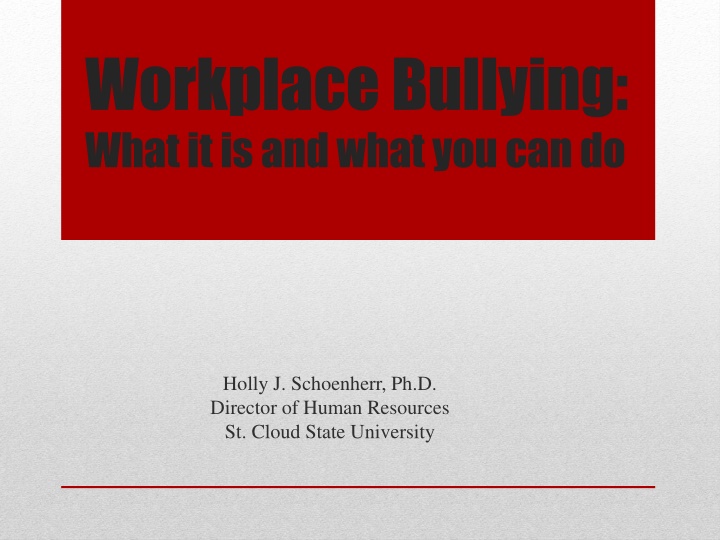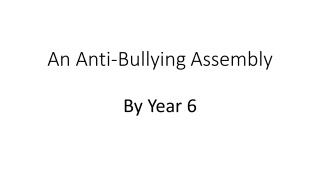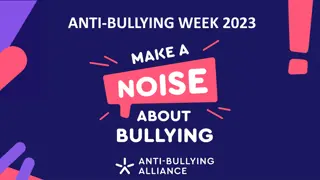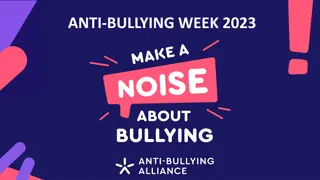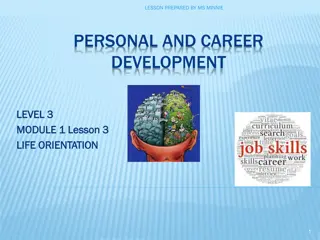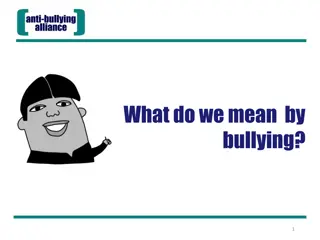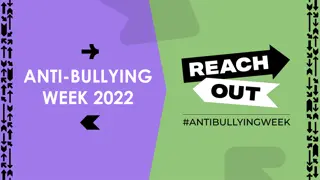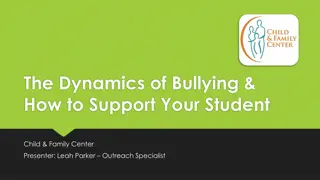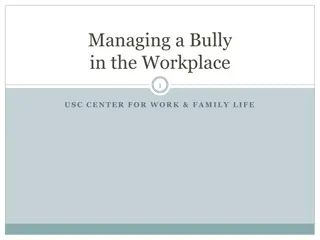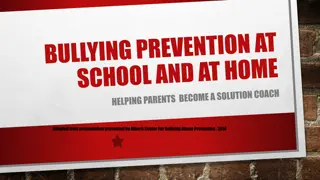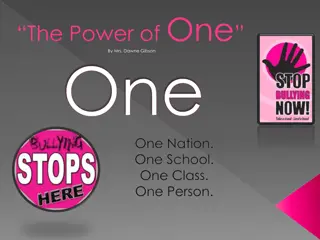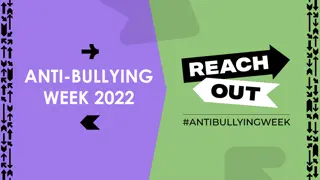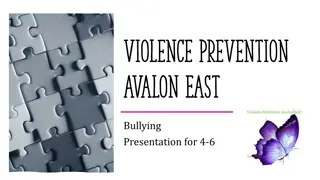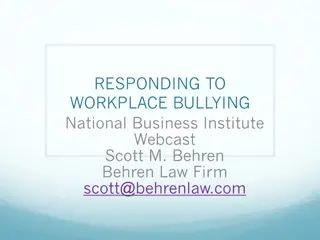Workplace Bullying: How to Recognize and Address It
Workplace bullying, defined as repeated mistreatment that harms individuals, can take various forms such as verbal abuse and work interference. It differs from sexual harassment and discrimination, targeting individuals based on different reasons. Recognize the signs of bullying and take appropriate action to address and prevent it in the workplace.
Download Presentation

Please find below an Image/Link to download the presentation.
The content on the website is provided AS IS for your information and personal use only. It may not be sold, licensed, or shared on other websites without obtaining consent from the author.If you encounter any issues during the download, it is possible that the publisher has removed the file from their server.
You are allowed to download the files provided on this website for personal or commercial use, subject to the condition that they are used lawfully. All files are the property of their respective owners.
The content on the website is provided AS IS for your information and personal use only. It may not be sold, licensed, or shared on other websites without obtaining consent from the author.
E N D
Presentation Transcript
Workplace Bullying: What it is and what you can do Holly J. Schoenherr, Ph.D. Director of Human Resources St. Cloud State University
Examples of Bullying Behaviors: Yelling, screaming Constant criticism Inconsistent compliance with rules Threatening job loss Insults and put-downs Discounting/denial of accomplishments Exclusion from a group
Bullying Defined Workplace Bullying is repeated, health-harming mistreatment of one or more persons (the targets) by one or more perpetrators that takes one or more of the following forms: Verbal abuse Conduct which is threatening, humiliating, or intimidating Work interference, sabotage, which prevents work from getting done Exploitation of a known psychological or physical vulnerability --The Workplace Bullying Institute
How is Bullying different from Sexual harassment includes unwelcome sexual advances, requests for sexual favors, sexually motivated physical conduct, and other verbal or physical conduct of a sexual nature when: Submission to such conduct is made either explicitly or implicitly a term or condition of an individual's employment or education, evaluation of a student's academic performance, or term or condition of participation in student activities or in other events or activities sanctioned by the college or university; or Submission to or rejection of such conduct by an individual is used as the basis for employment or academic decisions or other decisions about participation in student activities or other events or activities sanctioned by the college or university; or Such conduct has the purpose or effect of threatening an individual's employment; interfering with an individual's work or academic performance; or creating an intimidating, hostile, or offensive work or educational environment. Harassment?
How is Bullying different from Harassment? Discrimination? Discrimination means conduct that is directed at an individual because of his or her protected class and that subjects the individual to different treatment by agents or employees so as to interfere with or limit the ability of the individual to participate in, or benefit from, the services, activities, or privileges provided by the system or colleges and universities or otherwise adversely affects the individual's employment or education.
How is Bullying different from Harassment? Discrimination? Healthy Conflict? Healthy conflict occurs when individuals of diverse backgrounds and personalities are able to speak candidly about matters of interest to them, ask difficult questions, challenge ideas and propositions that do not seem right to them, and work together to achieve optimal solutions in a mutually respectful manner. Video
Behaviors in Healthy Conflict Focus on substance or problem not person or the other party. Understand that the situation is not about you or me, it s about the problem. Assume good intentions. It s easy to make stuff up if you think the other party is out to get you. Both parties should assume good intentions. Assume that the other party means well, that he or she is seeking optimal solution. Be open and willing to consider the merits of alternative arguments. In doing so, you acknowledge the possibility that the other person might have an idea or perspective that you did not consider. This behavior signifies openness, humility and respect for the other party. Have enough awareness to understand when emotions are rising (e.g., changes in tone of voice and body language) and know when to stop a conversation to prevent a counterproductive event from occurring.
Legal Illegal Appropriate Inappropriate Sexual Harassment??
Legal Illegal Appropriate Sexual Harassment Inappropriate Discrimination??
Legal Illegal Appropriate Sexual Harassment Discrimination Inappropriate Healthy Conflict??
Legal Illegal Healthy Conflict Appropriate Sexual Harassment Discrimination Inappropriate Bullying??
Legal Illegal Healthy Conflict Appropriate Bullying Sexual Harassment Discrimination Inappropriate
Test your knowledge Scenario 1: Adam is a hard-working and responsible employee with autism. Adam has a difficult time dealing with certain sounds. These sounds make him feel very anxious, and he cannot focus on anything else when he hears these sounds. Two of Adam s co-workers have figured out that he is very sensitive to certain sounds. Whenever they go past Adam s work area, they make shhhhhh and buzzzz noises. Is this bullying?
Test your knowledge Scenario 2: James works at a computer repair store. He sometimes forgets to record and file the service reports after he fixes a computer. His co-worker has to do it for him 2 or 3 times per week. He often reminds James to record and file the reports and he asks him things like, Did you file the service report? Is this bullying?
Test your knowledge Scenario 3: Derrick works in an office setting. All of the other office assistants go to lunch together every day. Derrick packs his lunch and stays at the office to eat it. However, Derrick would like to go to lunch with them once in a while, but he doesn t know how to invite himself. The others have not invited him to go with them. Is this bullying?
Test your knowledge Scenario 4: Marcus is a smart, hardworking employee. Marcus is not very comfortable in social situations at work, and he tends to work alone. Marcus sometimes struggles to know what to say in conversations. He might say things that others view as strange or different. Marcus works near a guy named Ben. Almost every day, Ben asks Marcus lots of questions about his special interests and hobbies, and he won t stop asking. When Ben asks Marcus these questions, he is usually smirking or laughing. Is this bullying?
What you can do A. When the bully is a co-worker
What you can do A. When the bully is a co-worker B. When the bully is a boss Video
What you can do A. When the bully is a co-worker B. When the bully is a boss C. When the bully is you
Who can help? A. Supervisor B. Human Resources C. Employee Assistance Program
Homework assignment What can you do immediately to be a part of the solution? Start doing Stop doing Do better
